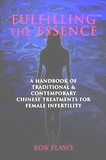Acupuncture & TCM Articles
Infertile Couples Should Try Acupuncture
Author: Scott Meyers
One of the most emotionally-charged medical issues that couples deal with today is infertility. This problem can drain a couple emotionally; it has been known to be the cause of many marital breakups. For those couples who love each other enough to make it through this issue, it can eat away at their finances as they try expensive fertility treatments, only some of which will wind up working. Thousands can be spent in the hopes of conceiving a baby and too often it is all for nothing. Now some couples are trying acupuncture to see if maybe that might provide a solution to their problem.
There are some limits to acupuncture when it comes to fertility treatments. An ethical and caring acupuncturist will tell their patients up front that acupuncture cannot cure all infertility problems. For example, if there is physical damage, then acupuncture is unable to help. Such problems are better handled by another kind of medical professional. But if the fertility specialist has told their patient that there appears to be nothing physically wrong, that they should be able to conceive, and the couple is still not successful in getting pregnant, it's difficult to know where to turn. For these couples, acupuncture may be able to help them to conceive.
If the health care provider or fertility specialist tells you that there is damage to one or the other of your reproductive organs, listen to them. They may still have methods by which they can help a couple conceive, but acupuncture will be of no direct help. But there are methods of acupuncture that can be done, and have shown positive results when structural damage is not the issue.
In addition to the well-known needle treatments, the acupuncturist may also suggest the use of some herbal teas. The treatments for fertility, though obviously somewhat different in nature and extent, can be used for both men and women.
The treatments usually involve the placement needles in the earlobes, eyebrows, ears and fingertips. Once the needles have been inserted carefully in the correct points the patient will relax for around a half an hour. Some acupuncturists tell their patients it takes only a few treatments to make a difference while others say it could take a few months.
This method of treating female infertility is said to work because it rebalances the hormonal levels in the body. The acupuncture treatments are often in combination with the use of some herbs to reduce other hormone levels and help to regulate ovulation and so assist a woman to conceive.
The acupuncture treatments relieve stress. Often, when a couple is trying to conceive and do not have immediate success, the couple can come under a great deal of emotional pressure. This pressure can make it difficult conceive. In these cases, acupuncture alleviates stress and increases blood flow which can also help to retain the pregnancy if conception is successful.
Some people say that acupuncture is a desperate move by people desperate to have a baby. Yet it seems that all fertility treatment is exactly that and if something can help that is less financially and emotionally demanding then why not try it? It is safe, noninvasive and much less costly than most fertility treatments.
 Fulfilling the Essence: Fulfilling the Essence:
Traditional & Contemporary Chinese Treatments for Female Infertility
By Bob Flaws
DESCRIPTION: This book is another in Bob Flaws' series on gynecology. It is the most complete discussion of Chinese medicine on this subject available in English. It includes the TCM treatment for various Western diseases associated with infertility, including female immunologic infertility, fallopian tube blockage, endocrine imbalances, polycystic ovarian syndrome, uterine myoma, luteal phase defect, anovulation, and endometriosis.
Eighty percent of couples having regular sex without contraception will conceive within one year with another 10% conceiving after that. This suggests that around 10% of the population suffers from infertility. Of this number, 40% is due to female problems, 40% to male problems, and 10% to a combination of both acting synergistically. Peak fertility seems to occur between 21-25 years of age in both males and females after which it gradually declines. After 25 years of age, there is a 75% chance of pregnancy within 6 months. Approaching 30, this decreases to only a 47% chance. Approaching 40, this further decreases to only a 25% chance, and after 40 to a 22% chance. Another way of stating these statistics is that a woman's risk of infertility is 2 times greater in women between 35 and 44 than in women between 30 and 34. It also seems that the risk of infertility is 1½ times higher for African Americans than for whites.
| 